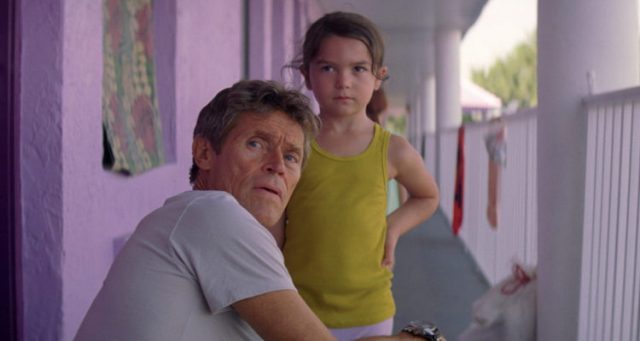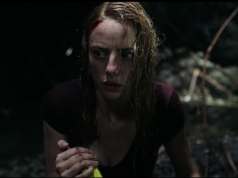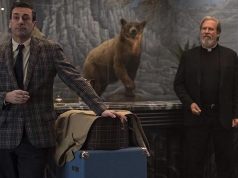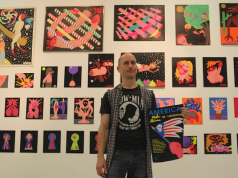
I can think of quite a few projects for the state of Florida to work on if they’re taking suggestions, but the wonderfully humane, heartbreakingly kind film called “The Florida Project” takes an unexpected route. Writer-director Sean Baker, whose “Tangerine” was also a warm visit with people on the fringes of society (transgender hookers, in that case), here presents a slice of life from the cheap motels of Orlando — in the shadow of Disney — where desperate, transient parents and their children eke out a surprisingly happy day-to-day existence with their temporary friends. Find joy wherever you can, you know?
Exuberant 6-year-old Moonee (Brooklynn Prince) and her turquoise-haired mother, Halley (Bria Vinaite), who can’t be more than about 23, find joy by visiting Halley’s friend Ashley (Mila Murder) at the waffle house down the street, getting free meals in exchange for Halley “watching” Ashley’s kid, Scooty (Christopher Rivera), while she’s at work. The most honest thing Halley does for income is buying knock-off cologne and perfume wholesale and reselling it on the street. She has other methods, too, though, which become problematic later on.
Moonee doesn’t know about any of that. She and Scooty spend their days mostly unsupervised (it’s summer; no school anyway), trotting around their motel, the Magic Castle, and the one next door, Futureland. (These dumps’ aspirational names are a mixture of amusing and sad. Get used to that combination.) They make a new friend, Jancey (Valeria Cotto), who lives with her Grandma Stacy (Josie Olivo), whose daughter got pregnant at 15. Moonee, precociously belligerent and already swearing at a 10th-grade level, gives the new kid a door-to-door tour of the motel: “The man who lives in here gets arrested a lot”; “The woman who lives here thinks she’s married to Jesus”; etc.
The manager at the Magic Castle, Bobby Hicks, is played by Willem Dafoe. When you learn that Dafoe is playing the manager of a seedy Orlando motel, you naturally assume his character is at least a sex-trafficking tattoo artist, if not a meth-fueled alligator-wrestler. But no! In what might be the most normal performance of his career, Dafoe is friendly and patient, doing what he can (within the bounds of the law) to help his ragtag guests and their ragamuffin children. Bobby has accepted that at this particular motel, his job responsibilities include being a semi-watchful, gruffly indulgent uncle, letting the kids play hide-and-seek in the office, keeping an eye out for roving pedophiles, and so forth. If Bobby is bitter about what his career in hospitality services has devolved into, he doesn’t show it.
There isn’t much plot to speak of. Halley and Ashley have a falling out when Ashley decides Moonee is a bad influence on Scooty. (The moms used to affectionately call each other “bitch”; after the split, Halley refers to Ashley as “that bitch,” which is something else altogether.) Bobby continually makes minor improvements to the motel, aided by his son (Caleb Landry Jones, also normal for once). The kids barge confidently up and down the street, bantering hilariously, scrounging up change for ice cream cones, playing in the local woods, standing on the motel’s second-floor balcony to spit on cars below.
It’s a garish, unrefined life, but the kids don’t know that. Kids can have fun anywhere, and one of the life-affirming pleasures of the film is seeing that principle in action. The kids are rough around the edges — they need more guidance and better parenting — but it’s heartening to see them feel so comfortable and free even in adverse circumstances. As Moonee says of a nearby tree that has continued to thrive despite being knocked over and partially uprooted, “This is my favorite tree because it fell down but it’s still growing.”
On paper, this is a movie about people in crisis. But Baker doesn’t tell it that way. Without judgment or disdain (you bring that to the table yourself), and helped by a cast of mostly inexperienced actors who give raw, natural performances, Baker presents these figures sympathetically as flesh-and-blood fellow humans who are just going through a rough patch. That some or all of them wound up here through their own poor choices is irrelevant, as is our sneaking suspicion that some of them will continue to make poor choices for the rest of their miserable lives. They are not inherently bad people, Baker seems to say — nobody is. In that sense, Dafoe’s Bobby is the filmmaker’s avatar, a charitable-minded, good-humored man who doesn’t forget his guests’ inherent worth as people even when they do. It is perhaps the only film I’ve seen where I watched Willem Dafoe and thought: I need to be more like that guy.
B+ (1 hr., 55 min.; )





